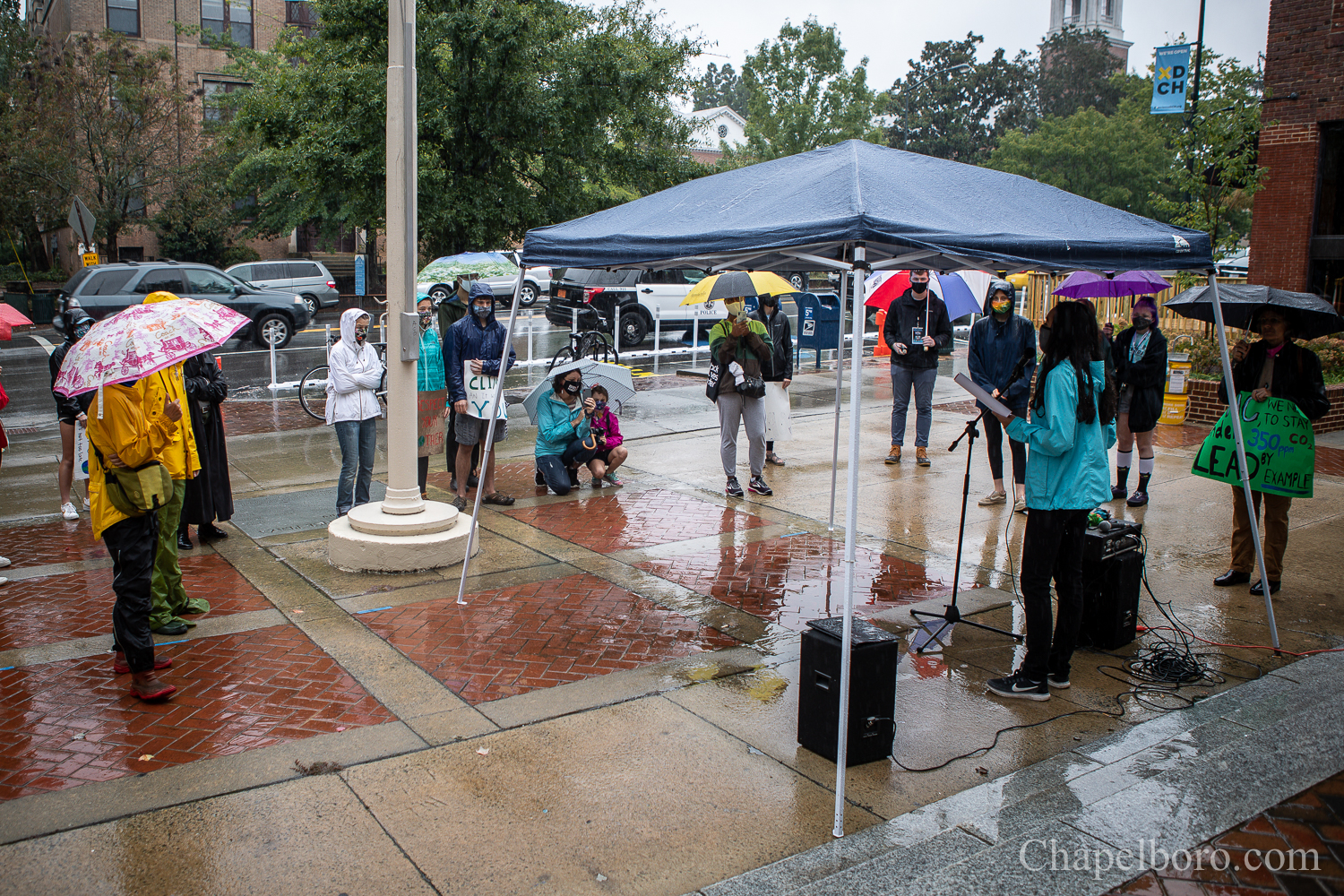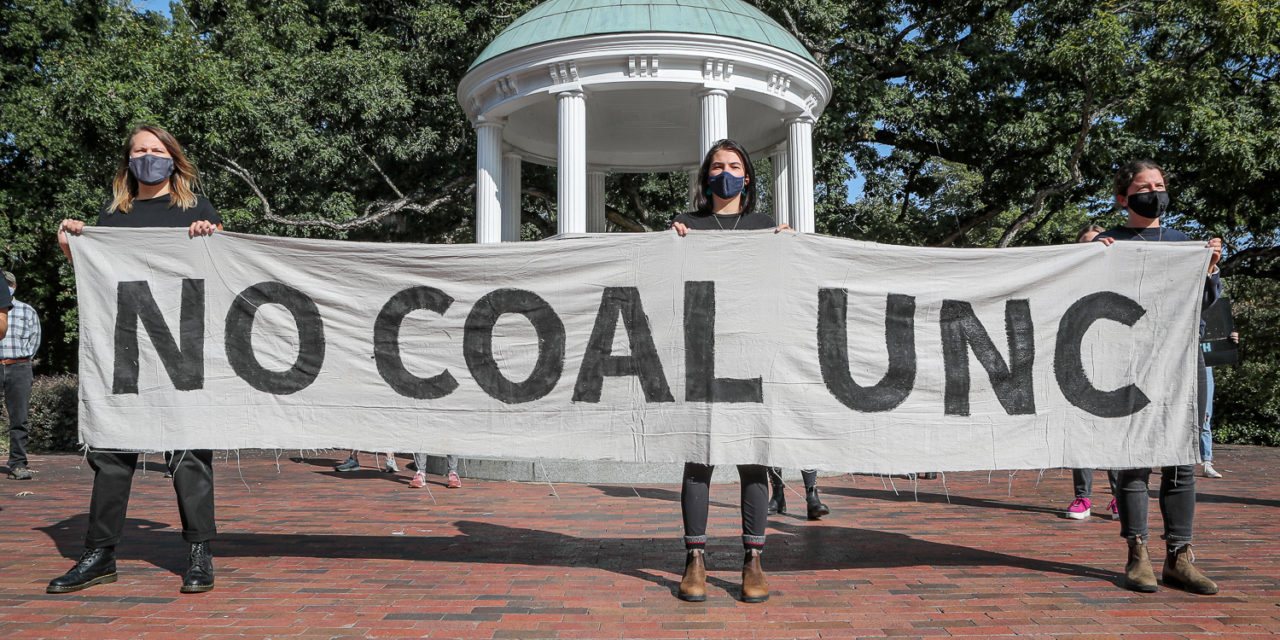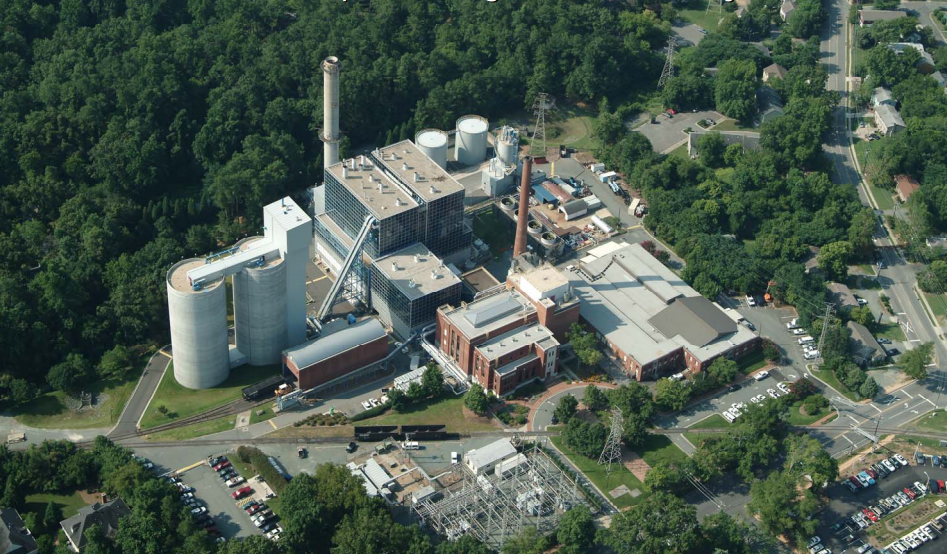There may not have been the thousands of demonstrators seen at protests in Sweden, India, Germany and other countries around the world, but the group that gathered in Chapel Hill on a rainy Friday morning shared the same message: it’s time to act against climate change.
Organized by Chapel Hill high schoolers to be part of the Global Day of Climate Action, the demonstration urged for institutions and the governments to prioritize changing climate injustice. Held for a second straight year, the group aimed to both raise awareness and call out inaction.
Margot Francini helped lead the event and is involved with Earth Uprising, a youth-led organization advocating for action to stop rising temperatures across the globe. She said holding the protest on Friday, rain or shine, was important to show solidarity with others speaking out against climate change.
“We want to make sure the voices of the Chapel Hill youth are heard,” said Francini, “and that we’re in coalition with the other sister strikes across the world. We understand this is a global crisis and we want to act with global action.”

Climate change protesters stand in Chapel Hill’s Peace and Justice Plaza on Friday, September 25.
A similar demonstration organized by a UNC student was held earlier in the week. Dozens of people gathered at the Old Well on UNC’s campus Tuesday to advocate for the university expanding its role in fighting climate change.
Orange County Commissioner Mark Marcoplos shared a few words to the group, saying he’s been concerned about the severity of environmental impact for many years.
“The climate crisis is the biggest threat facing humanity globally today,” he said. “We need to do everything that we can, large and small.”
One action both groups focused on is improving the environmental effects of UNC’s cogeneration facility just off campus on Cameron Avenue. The plant uses two 250,000-pounds per hour Circulating Fluidized Bed boilers, which are permitted to burn coal, biomass, natural gas and number 2 oil, to generate much of the campus’ electricity.
The university recently completed construction to increase the facility’s natural gas consumption while decreasing coal burning and continues work on a project to control gas in the boilers’ exhaust. In April, UNC Chancellor Kevin Guskiewicz also announced the creation of a sustainability commission to examine ways the university can meet the goals of its Three Zeros Environmental Initiative.
This morning, activists gathered at the Old Well on #UNC's campus and called for an end of the university's coal-fired plant.
Speakers said that UNC is "failing to protect is community and students."
Here's what we saw 📸 pic.twitter.com/nBzqrsQyuE
— WCHL & Chapelboro (@WCHLChapelboro) September 22, 2020
Marcoplos said, however, these changes are not enough to decrease the plant’s carbon and emissions footprint. While cogeneration is more energy efficient to a conventional coal-powered plant, burning coal is still part of UNC’s energy process and natural gases still create harmful emissions, both in their extraction and their use.
Marcoplos pointed to proposed action from previous university administrations to eliminate coal entirely as an example of the measures needed for UNC to set a national standard.
“This coal plant has been here for such a long time,” said the commissioner. “Ten years ago, Chancellor [Holden] Thorpe said it was going to be gone by 2020. New people came into control at UNC and they decided it wasn’t a priority. We need to keep reminding them that it is a priority and we need to make it happen.”

Shae Reinberg, a youth climate activist, addresses a socially-distanced group of demonstrators in the Peace and Justice Plaza on Friday, September 25.
On Friday, Francini shared similar thoughts, as well as many of the speakers at the youth-led strike. She said she believes it’s important UNC act now with its maximum amount of resources instead of allowing further environmental damage.
“It’s kind of hypocritical that they have this great public health school, but they also inflict public health issues on local communities with this power plant,” said Francini. “It’s important we use the resources this university has to make progressive change toward being a leader in a just transition to renewable energy and a renewable economy.”
Following speakers presenting at the Peace and Justice Plaza on Franklin Street, demonstrators on Friday marched down Franklin Street to Cameron Avenue and the UNC cogeneration facility.
Chapelboro.com does not charge subscription fees. You can support local journalism and our mission to serve the community. Contribute today – every single dollar matters.











